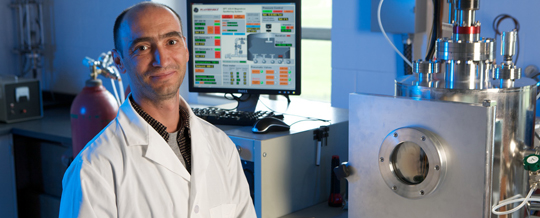Research What Western Engineering can do for you
Western Engineering is strongly committed to research directed
towards benefiting society. Our key research strengths have been
divided into the following nine major themes.
EMERGING GREEN TECHNOLOGIES
Western Engineering is a leader in emerging green technologies, responding to critical global environmental issues. Research within this theme includes: renewable energy initiatives (see also Energy Systems), biochemical engineering/biotechnology, biofuels, fuel and biofuel cells, environmentally friendly chemical processing (photocatalysis; air, water and soil pollution control), development of bio-solvents (supercritical fluids), among others. Western Engineering faculty members contribute significantly to this theme through several research projects spanning our four Departments. Faculty specializing in Environmental Engineering, Water Resource Engineering, and Nanotechnolgy are key in this theme. The recently constructed Claudette MacKay-Lassonde Pavilion, Western’s first “Green Building,” features the work of faculty and students in this area.
NATURAL DISASTERS MITIGATION AND MANAGEMENT
Western Engineering is considered to be an international powerhouse in Natural Disasters Mitigation. The Boundary Layer Wind Tunnel Laboratory is the premiere world research facility in wind engineering, the Geotechnical Research Centre has international reputation in areas of earthquakes and landslides, the Structures Group has strong expertise in earthquake engineering and the Water Resources and Systems Modeling Group has world class expertise on floods. The Institute for Catastrophic Loss Reduction provides the forum for research in disaster mitigation and policies. This strength helped attract the significant government funding for the highly visible and successful “Three Little Pigs” project at the Insurance Research Lab for Better Homes. A new $23.6 million facility dubbed the WindEEE Dome – Wind Engineering, Energy and Environment Dome – will focus on wind tunnel simulations to study wakes, boundary layers, jets and tornado-like vortices.
ENERGY SYSTEMS
Concerns of availability and sustainability, efficiency and cost-effectiveness are important challenges when considering the societal energy needs in and beyond the 21st century. Western Engineering faculty have recognized experts addressing such issues as distribution grids and linking different energy systems to the general grid, as well as improving development of reliable power systems including their delivery to the community in a cost-effective manner. Energy systems also includes a study of non-traditional fuel sources, such as biomass, wind and sun, and their applications.
NANOTECHNOLOGY
With innumerable practical applications possible, nanotechnology (broadly speaking, the study of materials less than one micron in size) is highly multi-disciplinary and represents an area of emerging strength within Western Engineering. Faculty from all four Western Engineering departments are conducting active experiments in Nanotechnology, several having developed a collaboration referred to as the Nano-Engineering Group. Some researchers are developing nanotechnology applications in their areas of specialization, including environmental engineering, materials and biomaterials engineering, as well as chemical processes among others. The research activities in this theme have attracted more than $3M in funding and resulted in several patents.
BIOMEDICAL ENGINEERING
Medical advancements are often fuelled by contributions from biomedical engineers. Our research activities in the highly multi-disciplinary field of Biomedical Engineering focus around biomaterials (both soft and hard), biomechanics, minimally-invasive and robotic-assisted surgery, and medical imaging. Faculty members with research expertise in materials engineering, chemical processes and even environmental engineering are players in the biomedical engineering theme.
AUTOMATION/MECHATRONICS/ROBOTICS
Research initiatives within this theme are diverse, and include discrete product manufacturing, materials development and testing, human biomechanics, computer vision, geometric inspection, scientific visualization, autonomous robotics, intelligent design and design methodology, and, minimally invasive surgical tools, as examples. Western Engineering, being along Ontario’s industrial corridor, is in a geographically ideal location to take advantage of the collaborative opportunities with industry. Faculty from the Departments of Mechanical & Materials Engineering and Electrical & Computer Engineering are captured within this theme.
INFRASTRUCTURE RENEWAL
Infrastructure Renewal is an area that has gained momentum as an issue in North America, as existing systems age and natural disasters create awareness of vulnerabilities. Western Engineering is making its mark through this theme. It involves faculty and students from the Department of Civil and Environmental Engineering (CEE), specializing in structures, water resources and systems modeling, environmental engineering, geotechnical and geoenvironmental engineering, natural disaster mitigation, and, wind engineering.
INFORMATION TECHNOLOGY
Western’s Department of Electrical and Computer Engineering has recently recruited a number of highly qualified faculty members in the areas of software engineering, communication and networking, and intelligent systems areas. With dedicated facilities such as the Bell Centre for Information Engineering and the EK3 Innovation Laboratory, Western is proud to boast successful spin-off companies such as EK3 Technologies Inc.
FLUID MECHANICS
Fluid Mechanics research at Western Engineering is recognized nationally for its breadth, effectively balancing theoretical, numerical and experimental techniques. The numerical modeling research is enhanced by the Ontario-wide SHARCNET supercomputing network. Physical modeling is supported by a world-class test facilities, the Boundary Layer Wind Tunnel Laboratory (BLWTL), state-of-the-art, non-intrusive, laser-based fluid measurement equipment, and a variety of small to large scale simulators of industrial processes and devices. Researchers specializing in chemical and pharmaceutical processing, particle technology, environmental engineering, water resource engineering, fluid mechanics, wind engineering and environmental fluid mechanics make this another strong theme for Western Engineering.
Also from this web page:
Contact
Dr. Hesham El Naggar
Associate Dean, Research & Graduate Studies
519-661-2111 x81433
Diana Lee
Research and Graduate Officer
Spencer Engineering Building, Room 2079
519-661-2111
x88327
Fax: 519-661-3808
click here to e-mail


